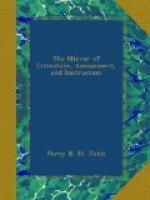* * * * *
YOUNG NAPOLEON
This poor boy, whose destiny has suffered so remarkable a change, appears to have been a child of great promise, both for intelligence and goodness of heart. The anecdotes concerning him are of the most pleasing kind. From the time that he knew how to speak, he became, like most children, a great questioner. He loved, above every thing, to watch the people walking in the garden and in the court of the Tuileries, over which his windows looked. There was always a crowd of people assembled there to see him. Having remarked that many of the persons who entered the palace, had rolls of paper under their arms, he desired to know of his gouvernante what that meant. He was told that they were unfortunate people, who came to ask some favour of his papa. From this moment he shouted and wept whenever he saw a petition pass, and was not to be satisfied till it was brought to him; and he never failed to present himself, every day at breakfast, all those which he had collected in the course of the day before. It may be easily supposed, that when this practice was known to the public, the child was never at a loss for petitions.
He saw one day under his windows a woman in mourning who held by the hand a little boy about four years old, also in mourning. This little fellow had in his hand a petition which he held up from a distance to the young prince. The boy would know why this poor, little one was clothed all in black. His governess answered that it was, no doubt, because his papa was dead. He manifested a strong desire to talk with the child.—Madame Montesquieu, who seized every occasion of developing his sensibility, consented, and gave an order that he should be brought in with his mother. She was a widow whose husband had been killed in the last campaign, and finding herself without resources, had petitioned the emperor for a pension. The young Napoleon took the petition and promised to deliver it to his papa. The next morning he made up his ordinary packet of petitions, but the one in which he took a particular interest he kept separate, and after putting the mass into the hands of the emperor according to custom; “Papa,” said he, “here is the petition of a very unfortunate little boy; you are the cause of his father’s dying, and now he has nothing. Give him a pension, I beg.” Napoleon took up his son and embraced him tenderly, gave him the pension, which he antedated, and caused the patent to be made out in the course of the day.—Translated from the French.—Westminster Review.
* * * * *
AN ESKDALE ANECDOTE.
Extract of a Letter from the Ettrick Shepherd.
I chanced to be on a weeks’ visit to a kind friend, a farmer in Eskdale-muir, who thought meet to have a party every day at dinner, and mostly the same party. Our libations were certainly carried rather to an extremity, but our merriment corresponded therewith. There was one morning, indeed, that several of the gentlemen were considerably hurt, and there were marks of blood on the plaster, but no one could tell what had happened. It appeared that there had been a quarrel, but none of us knew what about, or who it was that fought.




